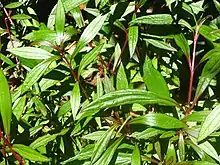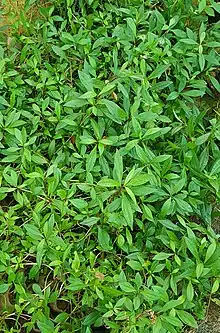Ayapana triplinervis
Ayapana triplinervis (aya-pana, water hemp) is a tropical American shrub in the family Asteraceae. This plant has long slender leaves which are often used in traditional medicine.[1] The flowers are pale pink and the thin, hairless stem is reddish in color.[1]
| Ayapana triplinervis | |
|---|---|
 | |
| Scientific classification | |
| Kingdom: | Plantae |
| Clade: | Tracheophytes |
| Clade: | Angiosperms |
| Clade: | Eudicots |
| Clade: | Asterids |
| Order: | Asterales |
| Family: | Asteraceae |
| Genus: | Ayapana |
| Species: | A. triplinervis |
| Binomial name | |
| Ayapana triplinervis (M.Vahl) R.M.King & H.Rob. | |
| Synonyms | |
|
Eupatorium ayapana Vent.[1] | |
Description
Ayapana triplinervis is an ascending, slender perennial. Its leaves are purple, subsessile, lanceolate, 3-nerved, acuminate, subentire, and glabrous. Inflorescence is a lax, few-headed corymb, heads pedicellate, about 20-flowered. Flowers are slaty blue.
Chemical constituents

Ayapana triplinervis is a source of several coumarin derivatives. The leaves contain a volatile essential oil, ayapana oil, 1.14%. This oil contains the coumarins ayapanin (herniarin) and ayapin, as well as other chemical compounds including stigmasterol, vitamin C, and carotene. The essential oil also contains thymohydroquinone dimethyl ether.[2]
The plant yields cineol, α-phellandrene, alpha-terneol, ayapanin, ayapin, borneol, coumarin, sabinene, and umbelliferone, among many others.
Phytochemical analysis of a methanolic extract yielded hexadecanoic acid (14.65%), 2,6,10-trimethyl,14-ethylene-14-pentadecane (9.84%), 7-butyl-bicyclo[4.1.0]heptane (2.38%), 8-methyldecanoic acid methyl ester (3.86%), 1-undecanol (7.82%), 1-hexyl-1-nitrocyclohexane (2.09%), 1,14-tetradecanediol (6.78%), and 2-hydroxyoctadecanoic acid 1,3-propanediyl ester.
References
- Ameenah Gurib-Fakim, Thomas Brendler (2003). Medicinal and Aromatic Plants of Indian Ocean Islands. p. 135. ISBN 978-3-88763-094-2.
- Anne Gauvin-Bialecki, Claude Marodon (November 2008). "Essential oil of Ayapana triplinervis from Reunion Island: A good natural source of thymohydroquinone dimethyl ether". Biochemical Systematics and Ecology. 36 (11): 853–858. doi:10.1016/j.bse.2008.09.006.